Enjoy the rich flavors of a Beef Bulgogi Bowl with spicy Korean miso sauce (Ssamjang). This gut-friendly entrée combines tender seasoned beef, sauteed veggies, and the probiotic benefits of the sauce for a nutritious and delicious meal. Add your own veggies and kimchi to the bowl for even more probiotic and veggie nutrition!
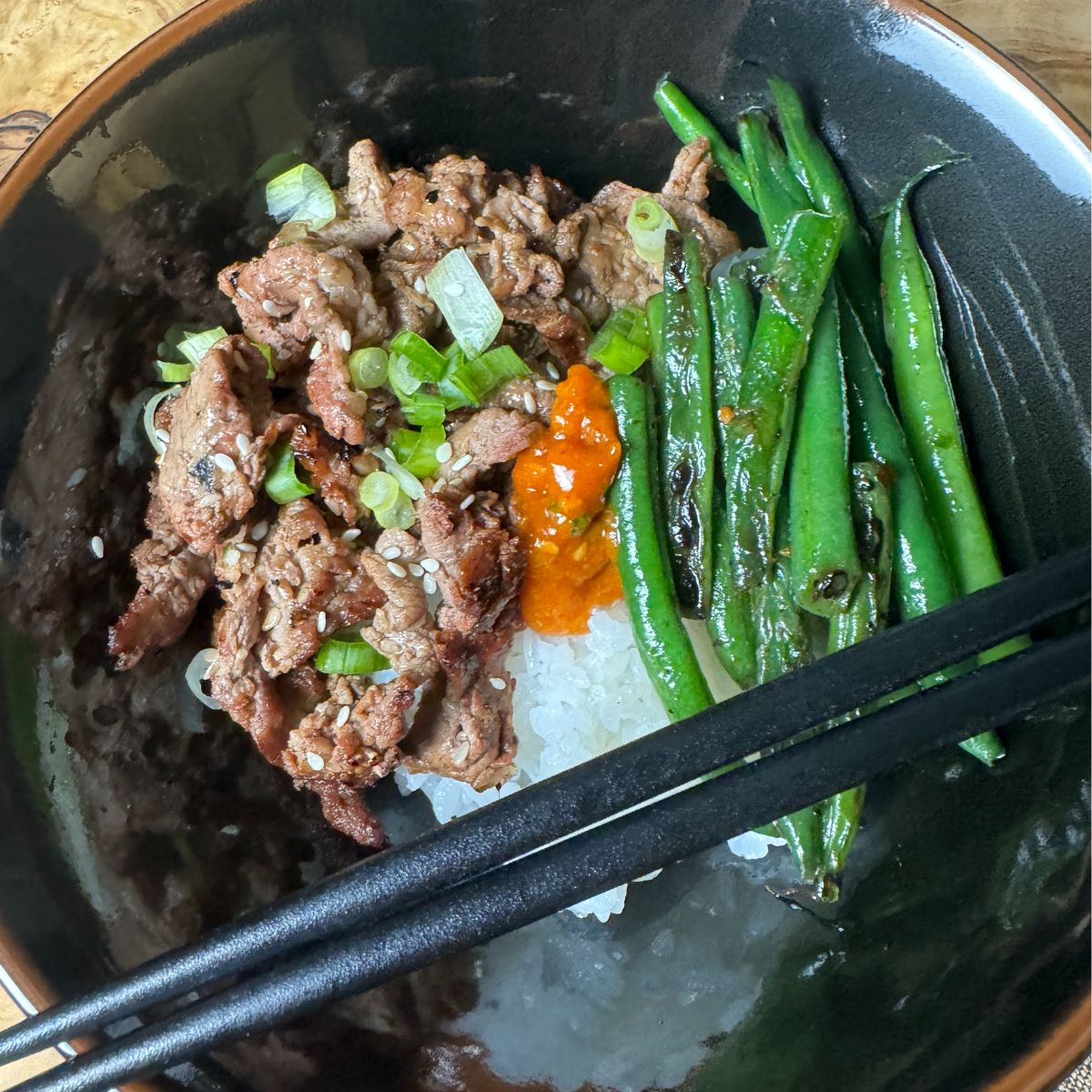
What is Beef Bulgogi?
Beef bulgogi is a traditional Korean dish featuring thinly sliced beef marinated in a mixture of soy sauce, sugar, sesame oil, garlic, and other seasonings. The name “bulgogi” translates to “fire meat,” reflecting its traditional method of cooking over an open flame.
The marinade infuses a savory, slightly sweet flavor to the beef and carmelizes nicely, especially when grilled. This dish is typically served with rice and various side dishes (e.g., banchan), making it a popular and flavorful Korean meal.
What is Ssamjang?
Ssamjang is a traditional Korean condiment made from a combination of gochujang (red chili paste), doenjang (fermented soybean paste), garlic, sesame oil, and various other ingredients such as green onions and sesame seeds.
The name “ssamjang” translates to “wrapping sauce,” as it is commonly used in ssam (wrapped) dishes, where it is spread on leafy vegetables like lettuce or perilla leaves, often accompanied by grilled meats, rice, and other side dishes. Ssamjang has a robust, savory, and slightly spicy flavor, adding depth and richness to Korean dishes.
Note: I used Japanese-style miso for the Ssamjang (so it is admittedly not traditional). Korean miso paste (doenjang) has a stronger and more pungent flavor when compared to the milder and sweeter Japanese miso. Doenjang is also coarser, while miso is smoother.
So if you use Japanese miso like I did, you will have a slightly sweeter, smoother version of the sauce.
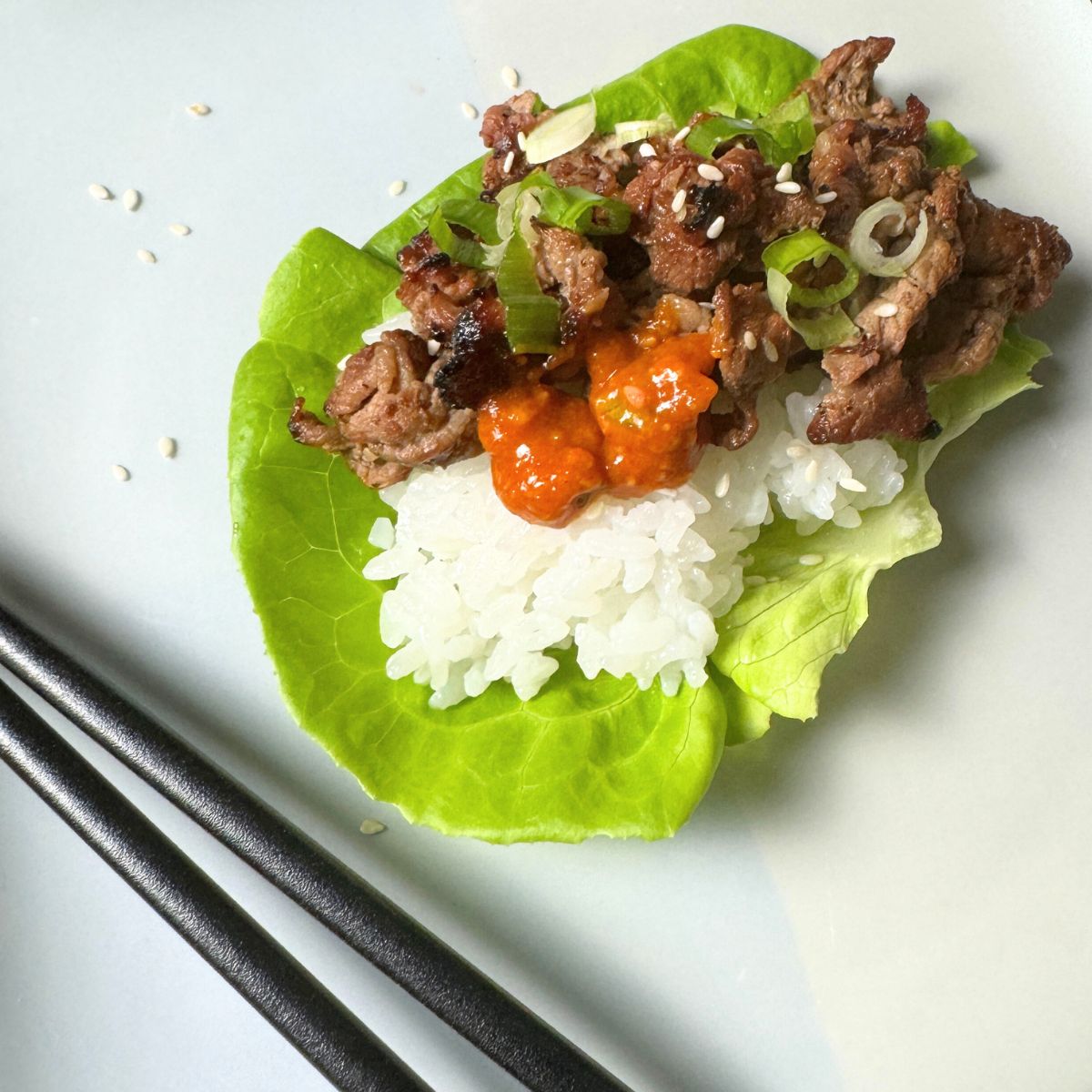
What Makes Beef Bulgogi Bowl Healthy?
Probiotics from Fermented Ingredients: Ssamjang contains fermented soybean pastes like doenjang (or miso as a substitute) and gochujang (Korean fermented hot chili paste), which are rich in probiotics. Probiotics help maintain a balanced gut microbiome, supporting our digestive health and immune system.
Tip: If you’re a fan of kimchi (another Korean fermented food), add that to the top of your bulgogi bowl as well for even more probiotic benefit!
Vegetable Fiber: The vegetables in the bowl contribute dietary fiber, vitamins, and minerals. Fiber is good for our digestive health and feeds the beneficial bacteria in our gut. Antioxidants in vegetables also help reduce inflammation and support overall health.
Healthy Fats: The sesame oil used in the marinade and ssamjang sauce contains healthy fats, which can aid in nutrient absorption and support overall digestive health.
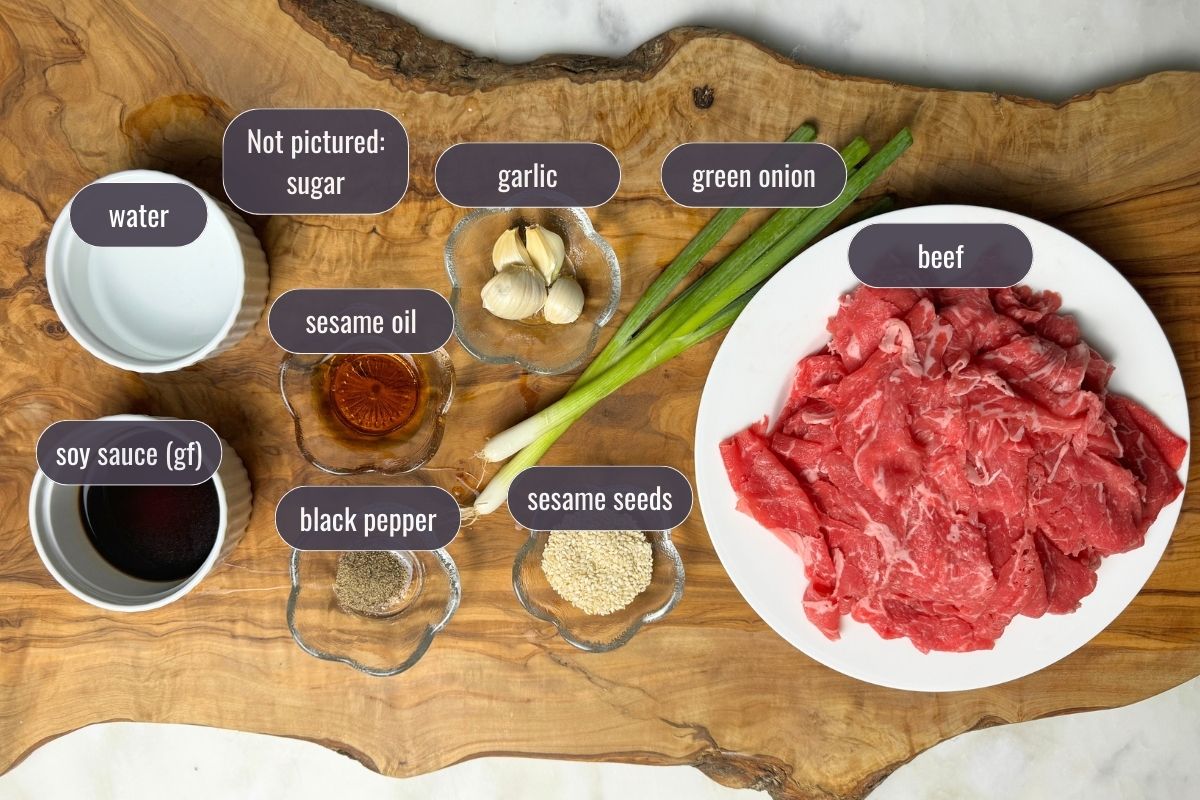
Ingredients
For the beef bulgogi part of the bowl, you’ll need:
- well-sourced beef — tenderloin, top sirloin or skirt — sliced thinly
- soy sauce (gluten-free if required
- green onions
- fresh garlic
- coconut sugar (or regular sugar)
- water
- toasted sesame oil
- toasted sesame seeds
- ground black pepper
- mirin (Japanese rice-based cooking wine, optional)
For the Spicy Korean Miso Sauce (Ssamjang), you’ll need:
- gochujang (Korean fermented hot chili paste) – I found this at my regular grocery store in the international food aisle
- hatcho miso or regular Japanese miso paste (this too can be found in Whole Foods or some many mainstream grocery stores)
- honey
- sesame oil
- rice vinegar
- green onion
- toasted sesame seeds
- fresh garlic
- crushed red pepper
For serving (in bowls):
- short grain white rice
- sauteed green beans or veggie of your choice
- kimchi (if desired) – you can find this at Asian markets, Whole Foods, or Costco. Ask your grocer as well.
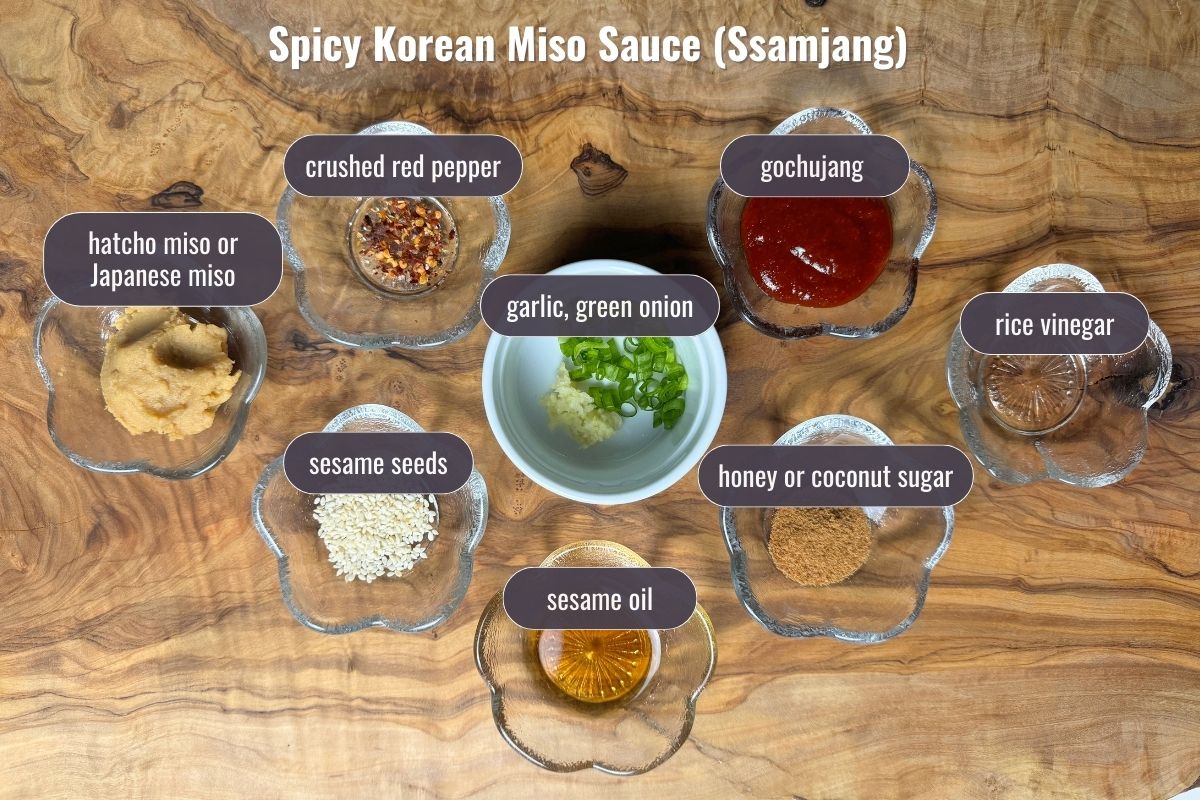
How to Make Beef Bulgogi
In a small bowl, mix the marinade by combining the soy sauce, garlic, green onion, sugar, water, sesame oil, sesame seeds, black pepper, and mirin (if using).
Add the sliced beef and mix everything together with your hands until the meat is coated in the marinade. Store in the fridge for at least 30 minutes.
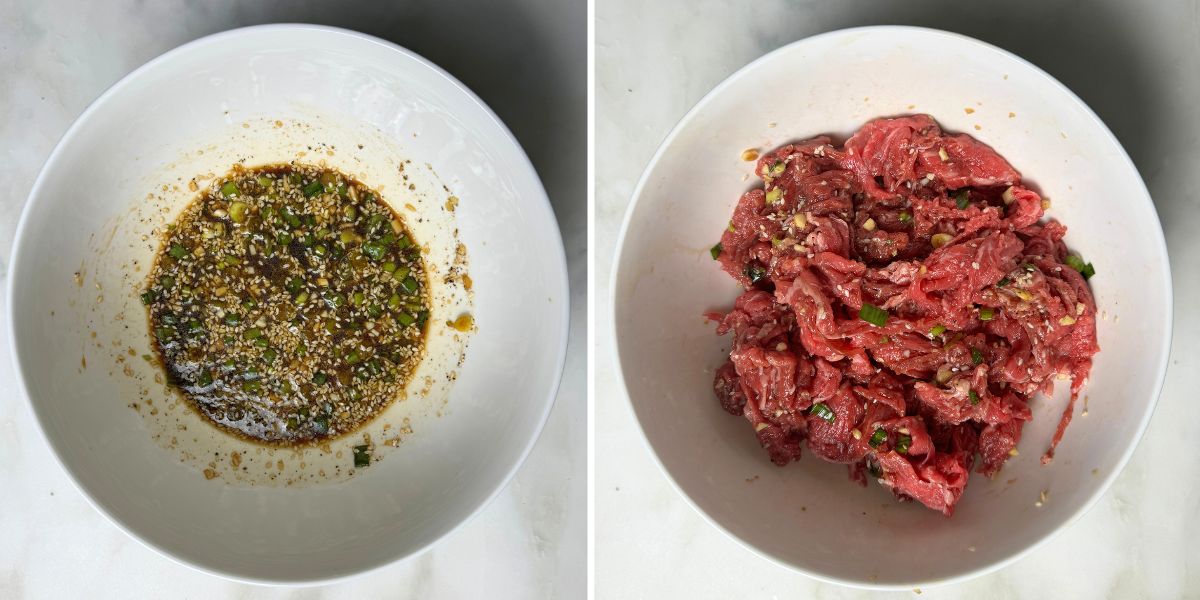
Grill the beef for 3 to 4 minutes (depending on thickness), moving the meat around to cook evenly.
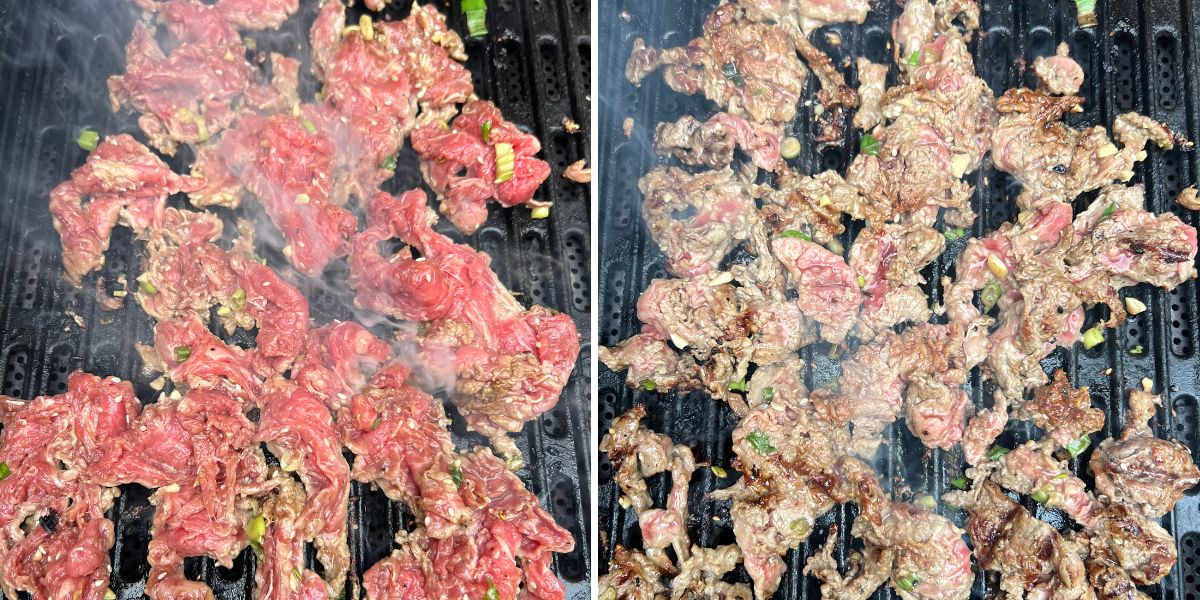
How to Make Spicy Korean Miso Sauce (Ssamjang)
Prepare the Ssamjang by whisking all of the sauce ingredients together in a small bowl.
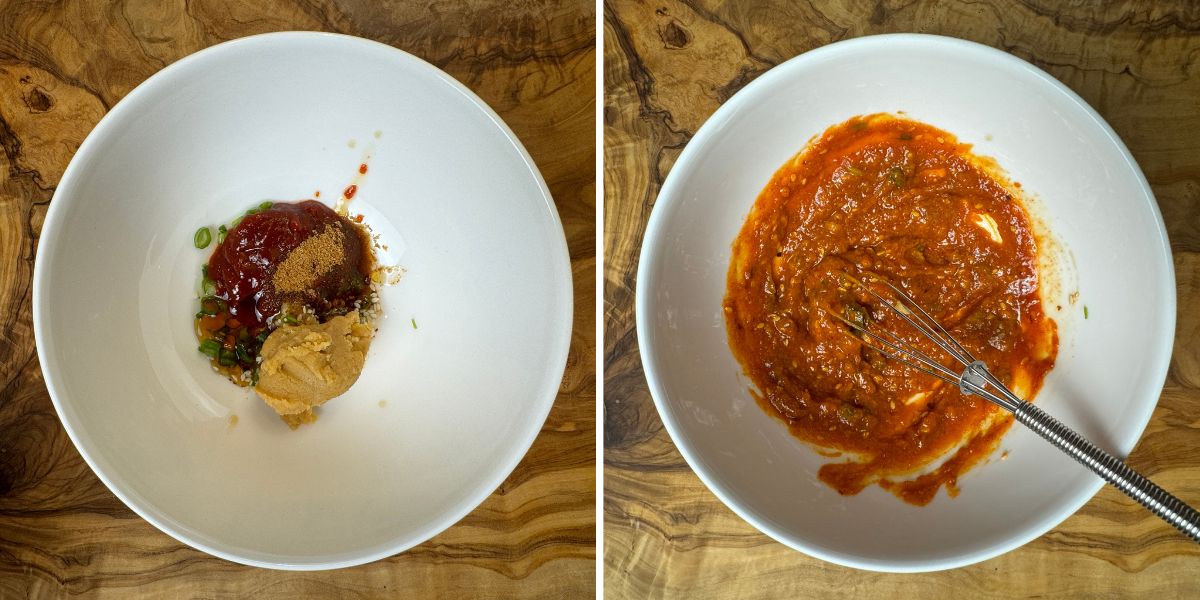
Prepare white rice and sauteed green beans (or other veggie of your choice).
Serve beef bulgogi, veggies, and kimchi (if using) in a bowl on top of white rice. Drizzle with Ssamjang sauce.
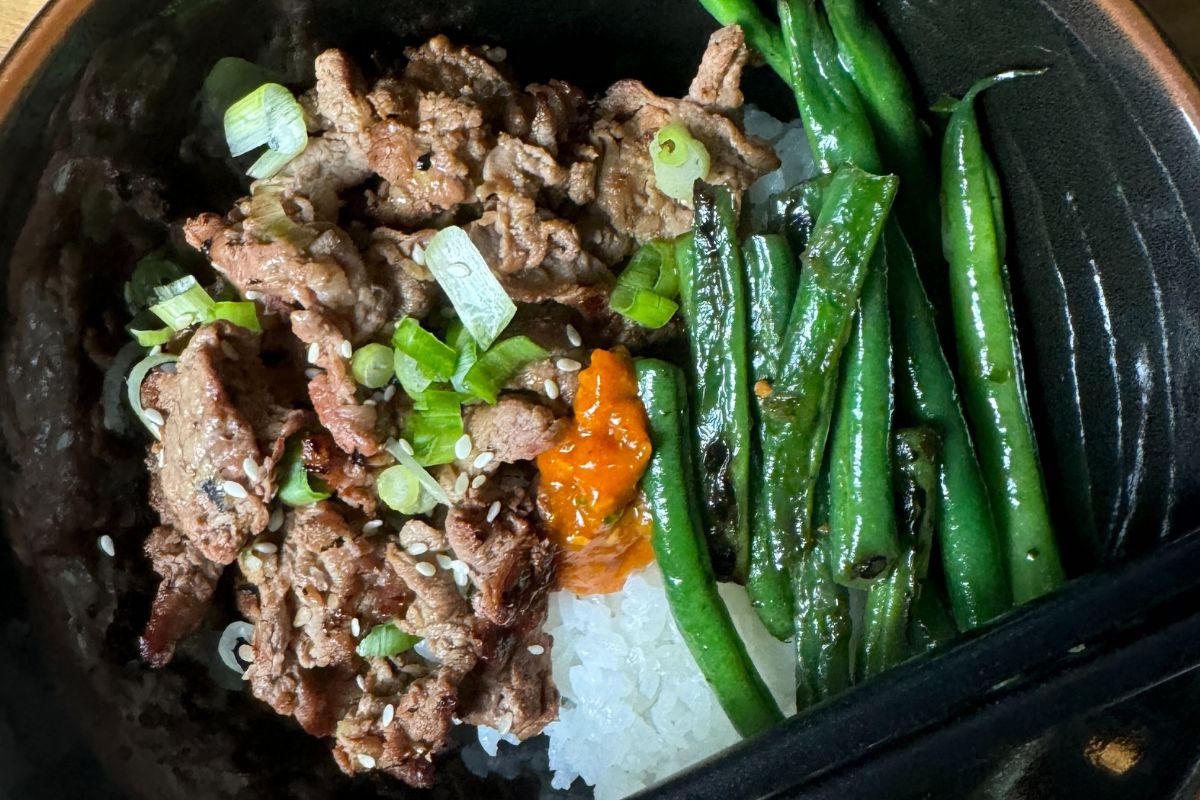
Recipe FAQs
What cut of beef is best for bulgogi?
Thinly sliced ribeye or sirloin is commonly used for bulgogi. These cuts are tender and absorb the marinade well, ensuring a flavorful dish.
Can I make this dish ahead of time?
Yes, you can marinate the beef and prepare the ssamjang sauce in advance. Store them in the refrigerator and cook the beef just before serving for optimal taste and texture.
How do I store leftovers?
Store leftover beef bulgogi and vegetables in separate airtight containers in the refrigerator for up to 3 days. Reheat the beef gently to avoid overcooking.
Can I make this dish gluten-free?
Yes, ensure all ingredients, especially soy sauce and miso, are labeled gluten-free. Tamari is a good gluten-free alternative to soy sauce.
What are other ways to cook the beef?
In addition to grilling, the beef can be broiled or stir-fried in a hot pan. Ensure it’s cooked quickly over high heat to retain tenderness and flavor.
What other items can I serve in the bowl?
In addition to steamed rice, veggies, and kimchi, other Korean side dishes like banchan or pickled vegetables are great.
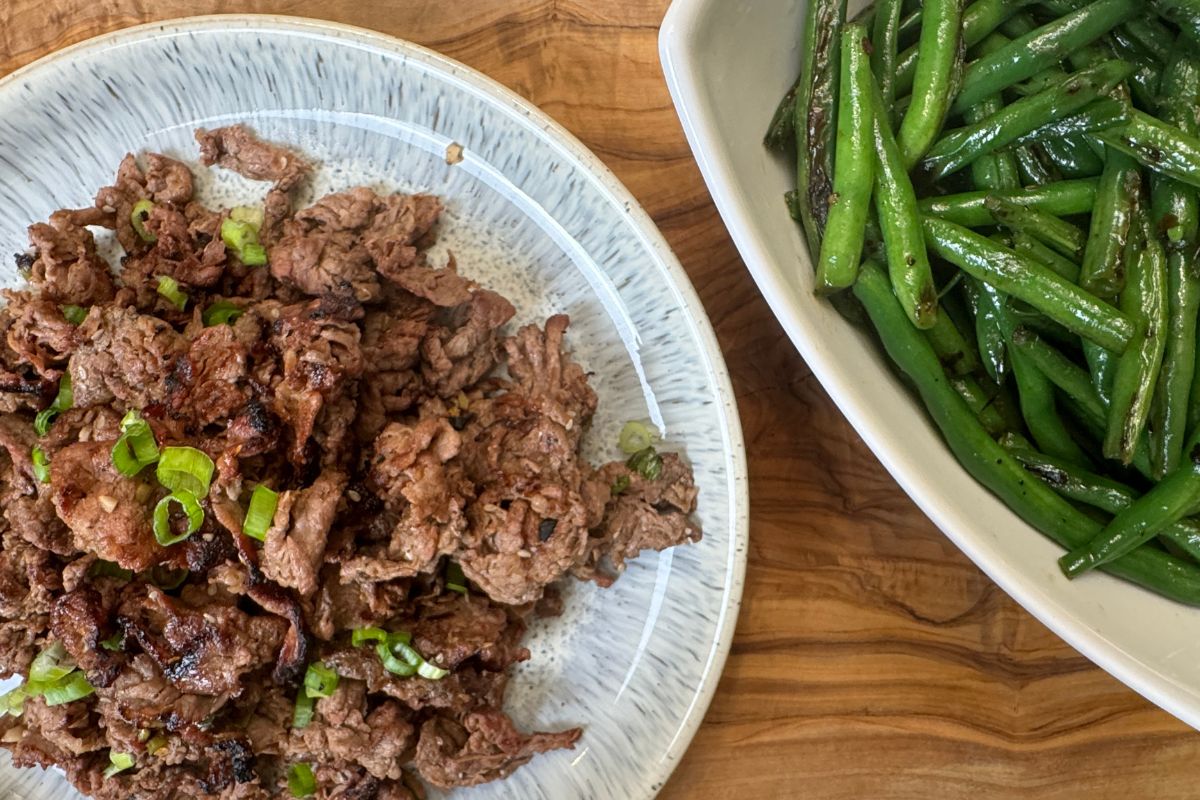
Beef Bulgogi Bowl with Spicy Korean Miso Sauce
Ingredients
For the Beef:
- 1 lb well-sourced beef -- tenderloin, top sirloin or skirt -- sliced thinly (roughly 1/8" thick)
- 2 tbsp soy sauce (gluten-free if required)
- 2 green onions, chopped
- 4 cloves garlic
- 2 tbsp coconut sugar (or regular sugar)
- 3 tbsp water
- 1 tbsp toasted sesame oil
- 2 tbsp toasted sesame seeds, coarsely ground
- 1/2 tsp ground black pepper
- 2 tsp mirin (optional)
For the Spicy Korean Miso Sauce (Ssamjang)
- 1 tbsp gochujang (Korean fermented hot chili paste)
- 1 tbsp hatcho miso or regular Japanese miso paste
- 1 tsp honey
- 1 tsp sesame oil
- 1/4 tsp rice vinegar (lemon juice as alternative)
- 2 tsp minced green onion
- 1 tsp toasted sesame seeds
- 1 clove garlic, minced or grated
- 1/2 to 1 tsp crushed red pepper
For Serving:
- white rice
- sauteed green beans or veggie of choice
- kimchi (if desired)
Instructions
- In a small bowl, mix the marinade by combining the soy sauce, garlic, green onion, sugar, water, sesame oil, sesame seeds, black pepper, and mirin (if using).
- Add the sliced beef and mix everything together with your hands until the meat is coated in the marinade. Store in the fridge for at least 30 minutes.
- Grill the beef for 3 to 4 minutes (depending on thickness), moving the meat around to cook evenly.
- Prepare the Ssamjang sauce by whisking all the ingredients together in a small bowl.
- Prepare white rice and sauteed green beans (or other veggie of your choice).
- Serve beef bulgogi, veggies, and kimchi in a bowl on top of white rice. Drizzle with Ssamjang sauce.

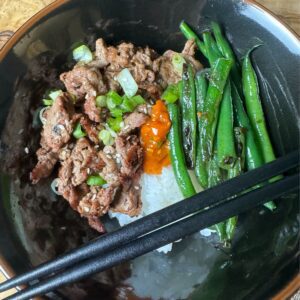
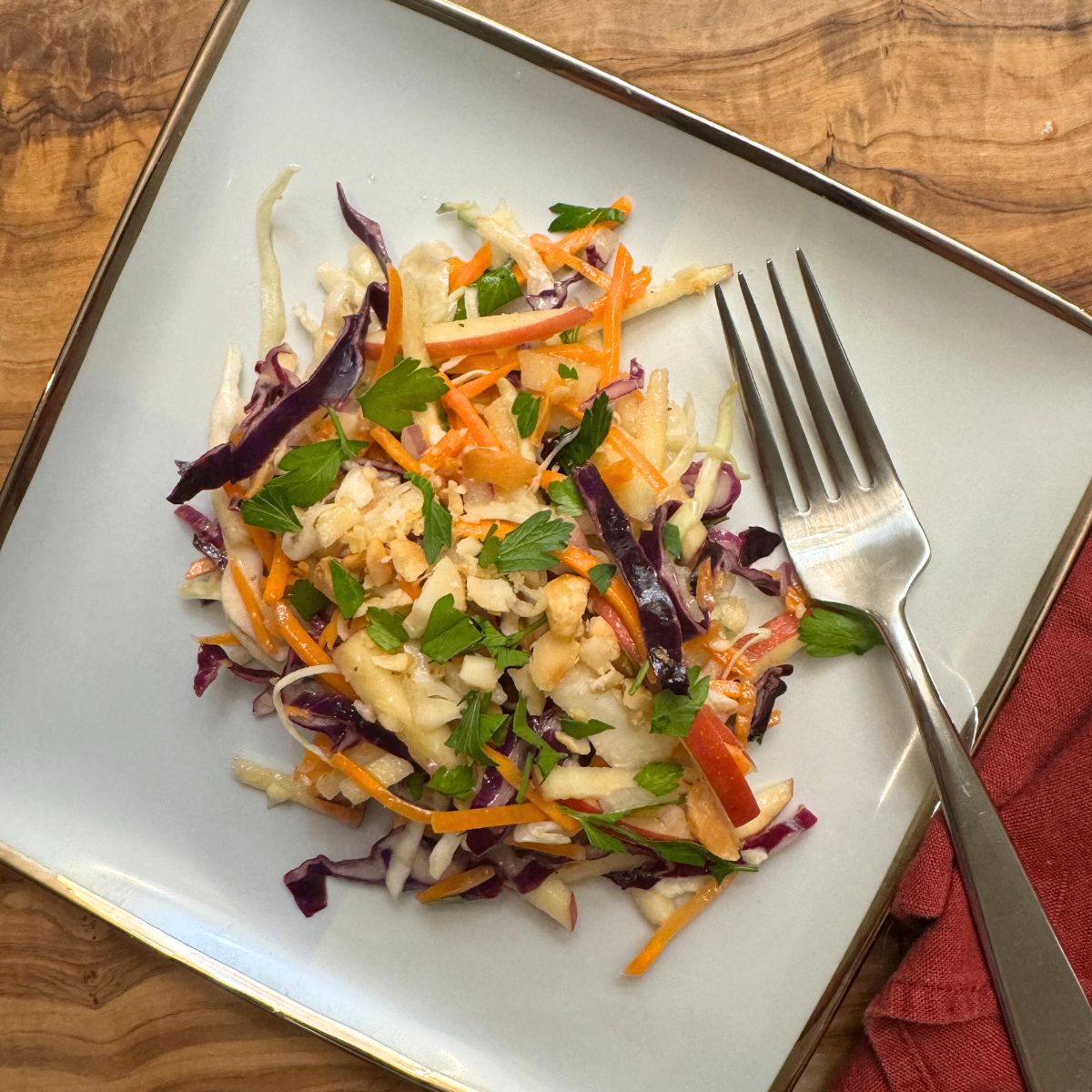
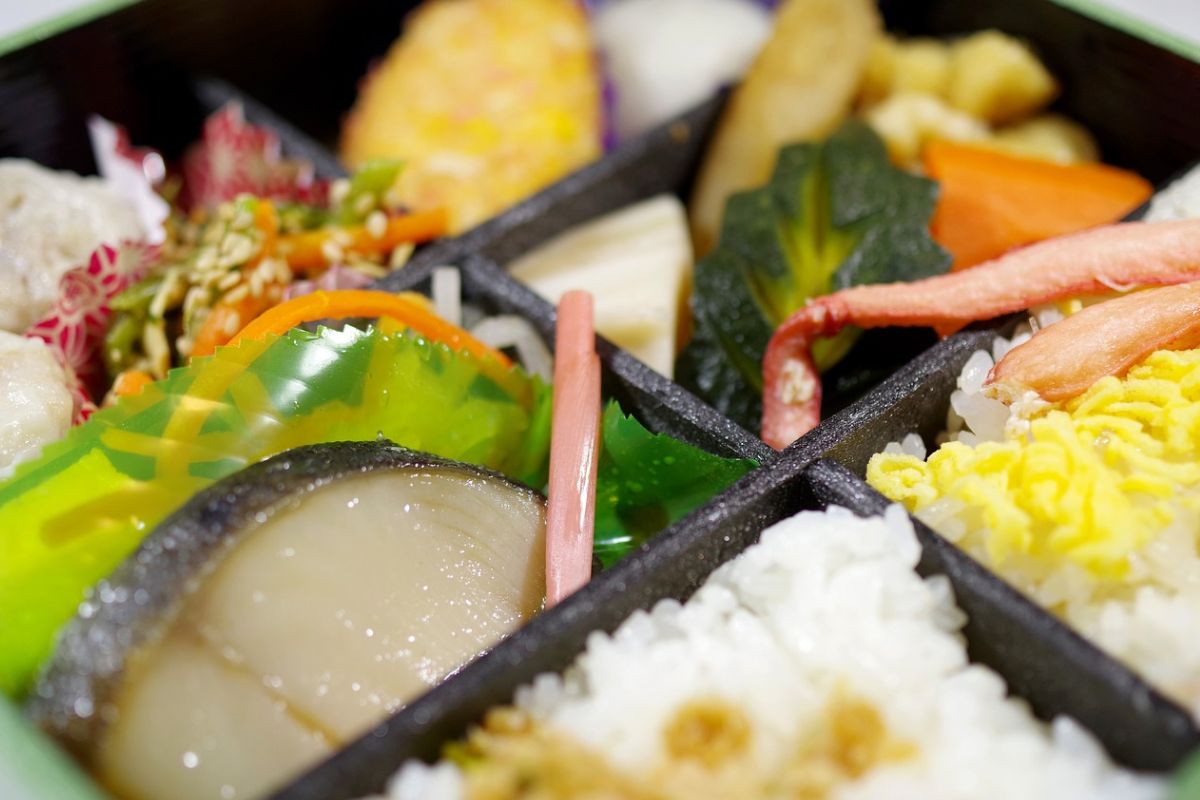
5 Comments
Family loved this. Surprised that the kids liked the sauce.
This makes a great meal in a bowl. I got the shaved beef from Trader Joe’s. Spreading it out in the gril was a bit challenging to turned out great.
This is so flavorful. A definite crowd pleaser. The ssamjang sauce is awesome and easy.
This is crazy good. And can be made with any side veggie. We’ve done Napa cabbage and asparagus- both great.
This is crazy good. And can be made with any side veggie. We’ve done Napa cabbage and asparagus- both great.